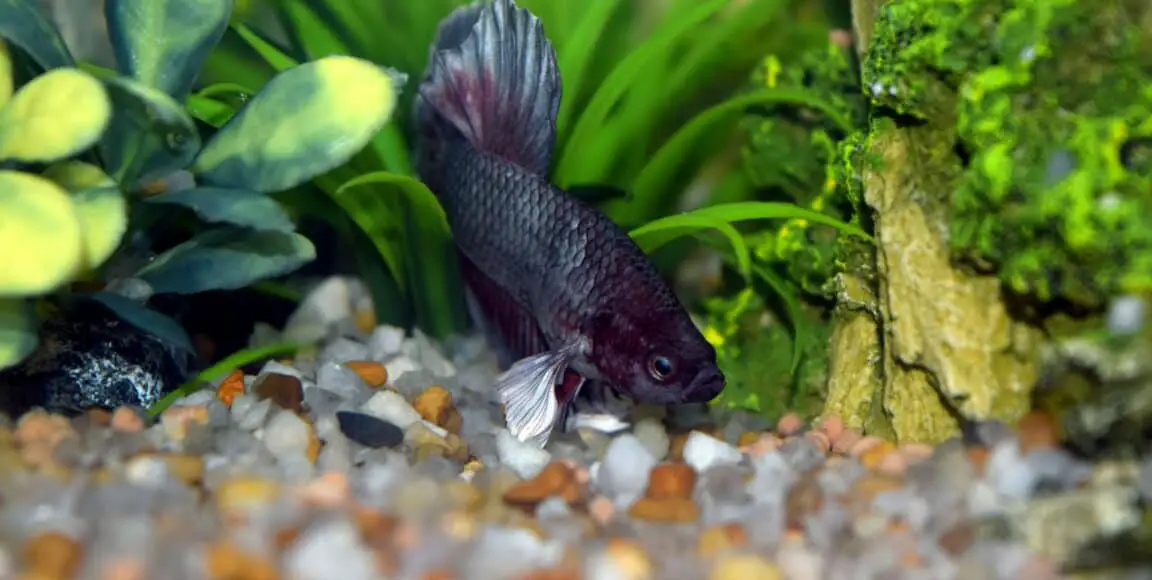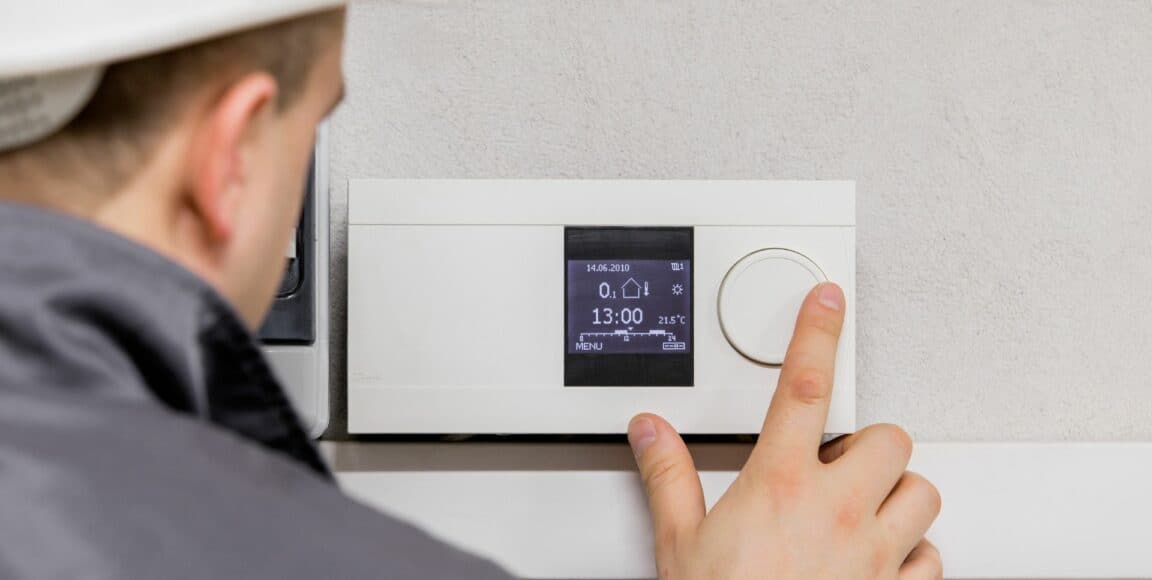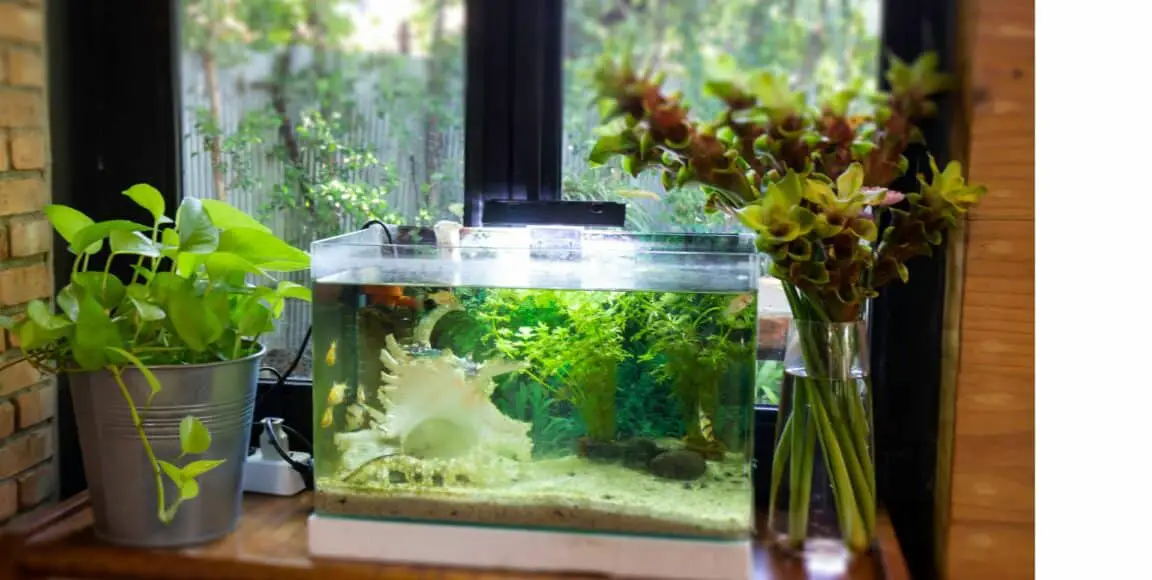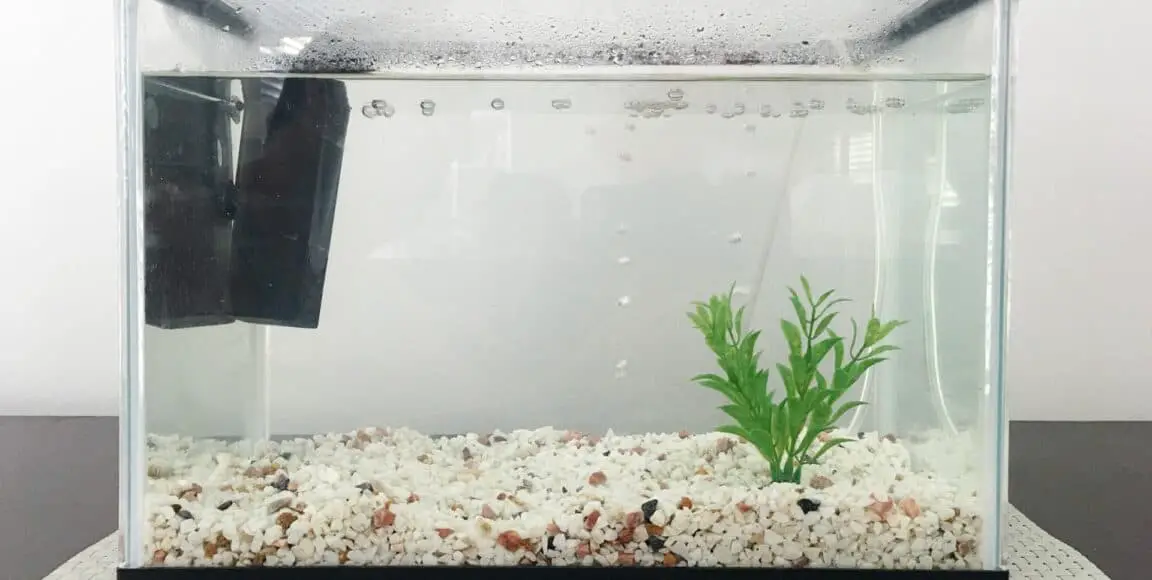Last Updated on February 1, 2023
Are you looking to learn how to warm up a betta tank without a heater?
We got you covered!
Bettas are sensitive creatures and require warm water to survive. If their tank water falls below 74°F (23°C), they can become lethargic, develop health problems, or even die.
Fortunately, there are several ways to keep your betta tank warm without a heater. We’ll discuss all of them and talk about some frequently asked questions.
Table of Contents
Why do bettas need warm tank water?
Betta fish originated from Thailand and spread around Southeast Asia, where the climate is of the tropical range.

The streams and rice paddies from which the betta fish originated are primarily shallow and let the sunlight constantly heat the water.
Fish keepers in tropical countries need not worry much about their betta fish tank temperature if it is kept at room temperature.
However, for hobbyists in colder countries, using a heater on any betta fish tank is always advised to keep the water temperature constant.
But there are some instances when you won’t be able to use a heater. Let’s say, for example, there’s a power outage, you’re moving houses, or the heater breaks down.
Some even might not have the budget to buy a heater in the first place.
How to keep betta fish warm without a heater?
If you fall into any of the mentioned scenarios, these are some ways to keep your betta fish tank warm without a heater.
Here are some things you can do if you can’t provide a heater for your betta fish tank.
Place your fish tank in a room that has a heater
This might not apply to people living in tropical countries, as temperatures tend to be more static.

However, if you live in colder climates, you can use the room heater to keep your tank at a steady and desirable temperature of 26°C or 80°F.
It allows you to control the temperature better, as you can adjust the room temperature to suit your betta’s needs.
Take advantage of natural sunlight
You can take advantage of the sunlight to provide warmth for your betta tank. But never put your tank in direct sunlight.

Sunlight is highly powerful, causing the water temperature can increase drastically.
As mentioned, bettas are quite sensitive to rises in temperature. It can also cause algae to grow rapidly and make your tank look dirty.
What you can do is place your tank near the window and use blinds to diffuse the sunlight.
This helps you manage the temperature better, but keep an eye out if it gets too hot for your betta’s comfort.
Turn on the light of your fish tank
Another way to keep your betta tank warm without a heater is by using its lights.
If you’ve already invested in an LED light for your betta tank, you can use it to generate heat.
The problem with this method is that you will need to turn the light off at night.
Fish require darkness to sleep, and leaving the lights on can cause algae blooms and disrupt their natural day-night cycle.
But as we know, nights are much colder than days. So I recommend combining this method with another one to provide your betta with a stable temperature.
Using hot water placed inside a water bottle
This is the least I can recommend among the methods on this list.
Using a hot water bottle is only a short-term solution. It is not practical in the long run and requires a lot of monitoring.
Fill an empty water bottle with hot water, close it tightly, and float it on the surface of your betta tank. Remember not to use boiling water as it can melt the container.
Check the temperature every few hours to ensure that drastic changes are avoided. Replace the water as needed when it cools down.
But just to give my two cents, it’s better to invest in a proper heater than this method.
Add decorations and plants inside your tank
Empty places tend to lose their heat faster than something that is filled up.
Adding decorations and plants to your betta tank will help it retain heat better.
Plants like Java Fern, Anubias, and Moss Balls are excellent choices for a betta tank as they don’t require too much light or attention.
They also promote healthy bacteria growth, which is beneficial for your betta.
Moreover, decorations like rocks, driftwood, and caves provide places for your fish to hide and help retain warmth in the tank.
Insulating your fish tank will also conserve heat
You should do this after doing one method previously described.
Very often, we forget that fish tanks are made of thin glass that can’t insulate heat very well.
To keep your fish tank warm, you can use bubble wrap or a towel to cover the sides of the tank.
Make sure to put spaces between the tank and the wrapping material for air to circulate.
This DIY insulator will make your fish tank retain its heat better, which is useful if you don’t have a heater.
No matter what you choose to do to keep this tropical fish warm without a heater, it is important to monitor the temperature of your tank and adjust accordingly regularly.
Be sure to have your aquarium water thermometer at all times.
This helps ensure that your betta can live comfortably and be healthy at all times.
Can betta fish survive in cold water?
Unfortunately, the answer is no.
Constantly exposing them to temperatures lower than 25°C or 77°F will make your betta sluggish and lose its appetite, leaving it vulnerable to diseases such as fin rot and ich.
The decreased temperature weakens their immune system, preventing them from fighting off invading microorganisms.
Ultimately, this can lead to death if the cold environment is not addressed and corrected.
If you love your betta, ensure their environment is suitable for them—warm, clean, and safe enough for a happy and healthy life. Cold and dirty water won’t do.
Related Article: Can Betta Fish Live in Cold Water
How warm should a betta tank be?
The habitat where the betta came from in tropical countries of Southeast Asia has a temperature range of 25 to 31.5°Cor 77 to 88.7°F. In an aquarium, betta fish needs a range of 25-27°C or 78-80°F.
It is important to provide a consistent temperature for your betta fish.
Instability may lead to stress, resulting in sickness or even death.
Bettas can survive in temperatures between 75-80°F. But the ideal water temperature is at 78°F to 80°F (25-27°C).
If you need to raise or lower the tank’s temperature, do it gradually, as sudden changes can shock the fish and cause severe stress.
Since wild bettas live in the tropical countries of Southeast Asia, they can survive the usual weather conditions of their native environment.
They can also transfer location if they detect any environmental changes. But bettas in an aquarium can’t do the same.
They are confined to one space. So it’s your responsibility to provide a good betta fish tank heater.
Additional tools to help keep your betta fish warm
Buy a stronger light
Using a stronger light is one way to keep your betta fish tank warm without an external heater.
Stronger lights emit more heat which warms the aquarium water gradually and helps maintain the temperature of the tank.
Aim for at least one watt per gallon, and use a LED light or fluorescent light.
You can also prolong the usage of the light by using a timer and setting it to turn off after 8 hours.
Transfer your betta to a smaller tank
A smaller tank is more efficient in conserving heat.

It’s easier to heat up, but maintaining the temperature is trickier. I don’t really suggest this in super cold areas. But it can work if the temperature is close to the ideal.
Get a canopy or a tank lid
A tank lid is an accessory or cover for your aquarium that prevents evaporation, keeps out dust and dirt from getting into the water, and helps to maintain the heat in the tank.
It also brings more security for your betta fish as it reduces the risk of jumping out of the tank.
Lastly, having a tank lid reduces the air exchange between your aquarium and the outside environment, which helps to maintain a consistent temperature in your tank.
Use battery-powered heat mats
Heat pads or mats aren’t only useful for body aches. They are also useful in keeping aquariums warm.
Place the heat mat under or beside your tank to warm your betta fish.
Just be sure to use a battery-powered one and not an electric-powered one. It’s safer and handier.
Some heat pads also come with adjustable temperatures so you can set it to the ideal temperature for your betta.
These are some tools you can use to help maintain a warm and comfortable environment for your betta fish.
With them, your betta will be able to thrive in its tank, no matter how cold the outside temperature is.
What happens if betta water is too hot?
It’s not only cold water that can be dangerous for betta fish.
A too-hot temperature (over 32°C or 90°F) can also be problematic for your betta fish and the beneficial bacteria in its tank.
This increases their metabolism, causing them to breathe faster through their gills or labyrinth organ, leading to exhaustion.
Warmer water also has lower oxygen levels, which can lead to a decrease in beneficial bacteria.
These bacteria need oxygen to break down ammonia, and if the temperature rises above 35°C or 95°F, the bacteria will die, resulting in an ammonia spike.
Ammonia is highly harmful and can burn your fish’s gills and internal organs – ultimately leading to death.
Additionally, hot temperature encourages algae growth, which can clog your filter and lead to an unhealthy tank.
If your betta’s water temperature is too hot, you should reduce it immediately. You can do this by adding cooler water or using a water chiller.
A thermometer should also be used to monitor the temperature regularly. Keeping the temperature regulated will ensure your betta fish has a safe and healthy environment.
If you notice the following signs, your betta’s water temperature may be too hot:
- The fish may become sluggish and lie at the bottom of the tank.
- Loss of appetite or refusal to eat any food.
- Panting or rapid, shallow breathing, which is a sign that the fish desperately need more oxygen.
- Rubbing and scraping against decorations in an attempt to cool itself off.
- Bulging eyes and a discolored face result from thermal stress, which can be fatal if left untreated for too long.
What to do if betta fish’s tank water temperature is too hot
There may be days when it will be a lot hotter than normal. Check the temperature of your aquarium water and do the following:
- Turn off the lights of your aquarium. This will reduce the tank’s temperature, allowing your betta to cool down.
- Block any sunlight that may shine on your tank. Direct sunlight can increase the tank’s temperature and cause your betta to become stressed.
- Remove the tank’s cover/lid and replace it with a net. Removing the lid will allow hot air to escape, resulting in a cooler environment for your fish.
- Direct an electric fan’s airflow toward the surface of your betta fish tank. A fan will help circulate air within the aquarium while providing cooling relief.
- Float an ice pack. Placing an ice pack in a sealed baggy and then floating it in the aquarium is a good way to reduce heat without affecting water temperature too quickly or drastically.
Again, ensure you are not decreasing the water temperature too fast because it will shock your fish.
One degree Celsius or 2 degrees Fahrenheit every 8 hours is enough. Note the temperature and keep it stable if you reach the normal range.
Should I still invest in a heater?
Absolutely! A fish tank heater is essential for maintaining a healthy temperature in your betta fish tank.
It is essential during the colder months when the temperature fluctuates.
A good water temp for bettas is between 76 and 80 degrees Fahrenheit (24-26°C), so a heater helps you maintain this range.
A quality aquarium heater will last for years and ensure your betta has a comfortable and safe environment.
Benefits of having a fish tank heater
I know I’ve provided some good alternatives above, but nothing is as convenient and reliable as having a tank heater. Here are some of its benefits:
Provides more control in the temperature
A heater allows for more precise temperature control in the tank, making it easier to keep the betta fish comfortable and healthy.
This is something you can’t do with most of the alternatives above.
With a heater set at the right level, you can ensure that your betta has the ideal environment to thrive in.
Less rise and fall in temperature
Fish tank heaters also help maintain an even temperature throughout the tank, eliminating thermal stratification that can harm fish.
This means that warm and cold water won’t mix and cause drastic temperature fluctuations, making life difficult for your betta.
Less monitoring on your part (at least for automatic heaters)
Some aquarium heaters come with thermostats and alarms to alert you when the temperature is too high or too low.
If you have one of these, you don’t need to check your betta tank constantly.
The alarm will go off if there’s a problem, and you can take action immediately.
It can help reduce the stress of your betta fish
Heaters can help reduce stress on the fish by providing them with consistent temperature levels, which they can rely on.
Constant fluctuations in temperature affect not only their physical health but also their psychological health;
Having a reliable heater ensures that these fluctuations don’t occur often or drastically enough to put them under too much stress.
Works well in an extremely cold season
Finally, a good tank heater helps prevent dangerous temperature drops or spikes during extreme weather conditions, such as freezing winter or hot summer days.
If unchecked, these temperatures could prove deadly for your finned friends.
So, investing in a good quality heater is essential for peace of mind and comfort for all aquatic life inside your betta fish tank!
Related Article: What Is the Best Heater for 20-Gallon Betta Tank?
FAQs
Can betta fish live without heater?
Yes, betta fish can live without a heater. But it will depend on the overall temperature of your place. If it doesn’t go below 74°F/23°C, your betta fish can survive without a heater.
How can I heat my fish tank without a heater?
You can use aquarium lights, heat mats, insulator covers, or a hot water bottle for heating your fish tank. However, they are not as reliable and efficient as a heater.
Some filters also have a built-in heating mechanism which you can use to maintain a consistent temperature in the fish tank.
What happens if my betta fish gets too cold?
If your betta fish gets too cold, it will become sluggish and unresponsive. They might stop eating, have difficulty swimming, or develop swim bladder disorder.`
To prevent this, maintain the ideal tank temperature with a heater or one of the abovementioned alternatives.
Conclusion
Are you ready to help your betta thrive by warming up their tank without a heater?
Knowing how to warm the aquarium water can be vital to providing a healthy and comfortable environment for your betta fish.
We hope this article has given you some tips on maintaining the optimum temperature in your aquarium without investing in an expensive heater.
